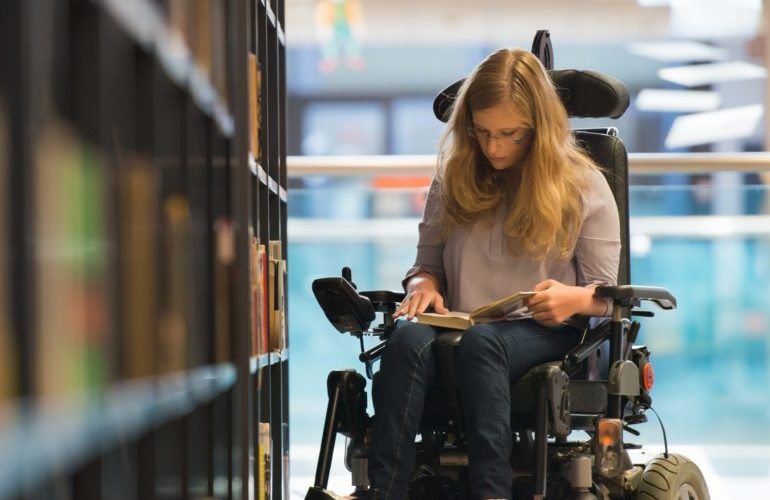Nine years ago, my family received some crushing news. Our son Drew, who was almost 2, had a little-known genetic syndrome called 22q. It’s a micro-deletion of the 22nd chromosome (I don’t understand it, either). On the one hand, we were relieved to finally have a diagnosis that explained his missed developmental milestones. On the other hand, something was wrong, and we were devastated. (Search “22q” to learn more about our family’s struggle.)
I’ve asked God many times to heal my son. I’ve prayed and wrestled with this a lot. However, I’m blessed and even thankful for the lessons I’ve learned on this journey. They’ve helped me become a better parent and youth worker. Here are 10 tips I’d like to share:
1. Treat kids with special needs as normal whenever you can. Like most boys, Drew loves monster trucks and hates school. He isn’t the same as other kids, but who is? He can’t do everything, but he can do most things. [tweet_dis]Encourage special-needs kids to participate whenever possible.[/tweet_dis]
2. Be honest when the fit isn’t good. Like most youth groups, ours can get a bit crazy. Games such as dodgeball are potentially dangerous when kids can’t protect themselves. Either have an adult sit and watch the game with a student or choose another game. For the most part, parents prefer honesty about any risks that might be involved.
3. Focus on teenagers’ strengths, not their limits. Every kid knows a lot about something. Find each young person’s specialty and let them use that knowledge and skill. For example, my son isn’t afraid to read out loud, so I call on him to read when I can.
4. View all aspects of youth group from the perspective of special-needs kids. They already feel like an inconvenience, so don’t make matters worse. For example, Tina,* a high schooler who’s in a wheelchair, couldn’t reach the snack counter in our youth room, so we made some adjustments.
5. Encourage friendship—and be a friend. Every kid needs friends. For special-needs kids, friends are tough to find. One of the coolest things I’ve seen at church was when a kid took Sam*, an autistic boy, under his wing and led him to a small group. Later I pulled that kid aside and thanked him for being a friend to Sam. Leaders need to get to know the young person, too. I struggled to befriend Sam until I found common ground with him (Pokémon Go—don’t judge!). Work to find something you both enjoy.
6. Enjoy the journey. Sam now loves coming to youth group, which is a first for him. Another first: In a reindeer race, he was pulled around the gym on a bed sheet. His team won and had a blast. Sam came to a lock-in, spending his first night away from home. He raked leaves for his first service project. That’s a lot of firsts we’ve experienced together, and we’ve enjoyed every one.
7. Realize that caring for one person communicates care to everyone. When you show students that special-needs kids are welcome and valued, you let everyone know they’re welcome and valued. Kids without special needs will realize they’ll always be accepted, no matter what they’ve done.
8. Remember that special needs mean special abilities. Recently in Sunday school, I asked kids to name a compassionate person they know. One said, “Drew Pape.” Because my son has been through a lot, he’s very kind and soft-hearted. I’d once envisioned raising an athletic super-star or an academic juggernaut, but I’m grateful for my son’s heart of gold. (I’m not sure I would’ve been able to raise such a compassionate kid without this syndrome. I might have cared too much about his athletic abilities or academic performance.)
9. Please ask. If you don’t understand a behavior or notice physical or social differences, talk to a parent. Heartfelt inquiries let people know you care. It’s better to have an awkward conversation than for a young person to be ignored or stared at. Don’t treat special-needs kids and families like the plague. Your kid won’t lose any chromosomes hanging out with my kid.
10. As a church, embrace special-needs families. At an annual checkup, the nurse/social worker encouraged our family to get involved in a faith community. “Fake it if you have to,” she said. “They’re a great support and encouragement.” For the most part, this has been true. Yet we’ve also experienced heartache. That might be one reason an estimated 80 to 90 percent of special-needs families are unchurched. (Data is tough to find. However, according to the Centers for Disease Control, 15 percent of kids ages 3 to 17 have a developmental disability. Do 15 percent of your youth group kids have special needs?)
A few more notes: Educate yourself about the condition. Search online or ask for information. Pray (for the young person, the family, schoolwork, doctor visits, and their future). Be there when you can; send a card when you can’t. If an event is being held for the condition, support or attend it.
Kids who are different shouldn’t feel unwelcome. That’s unacceptable (see Luke 14:12-14). As the body of Christ, we can do better. [tweet_box design=”default” float=”none”]Jesus specialized in special-needs ministry; let’s follow his example.[/tweet_box]
As I said earlier, I’m blessed and thankful. Take time to reach out to special-needs kids in your church and community. You’ll be blessed and thankful, too.
—
* All names except Drew’s have been changed.

